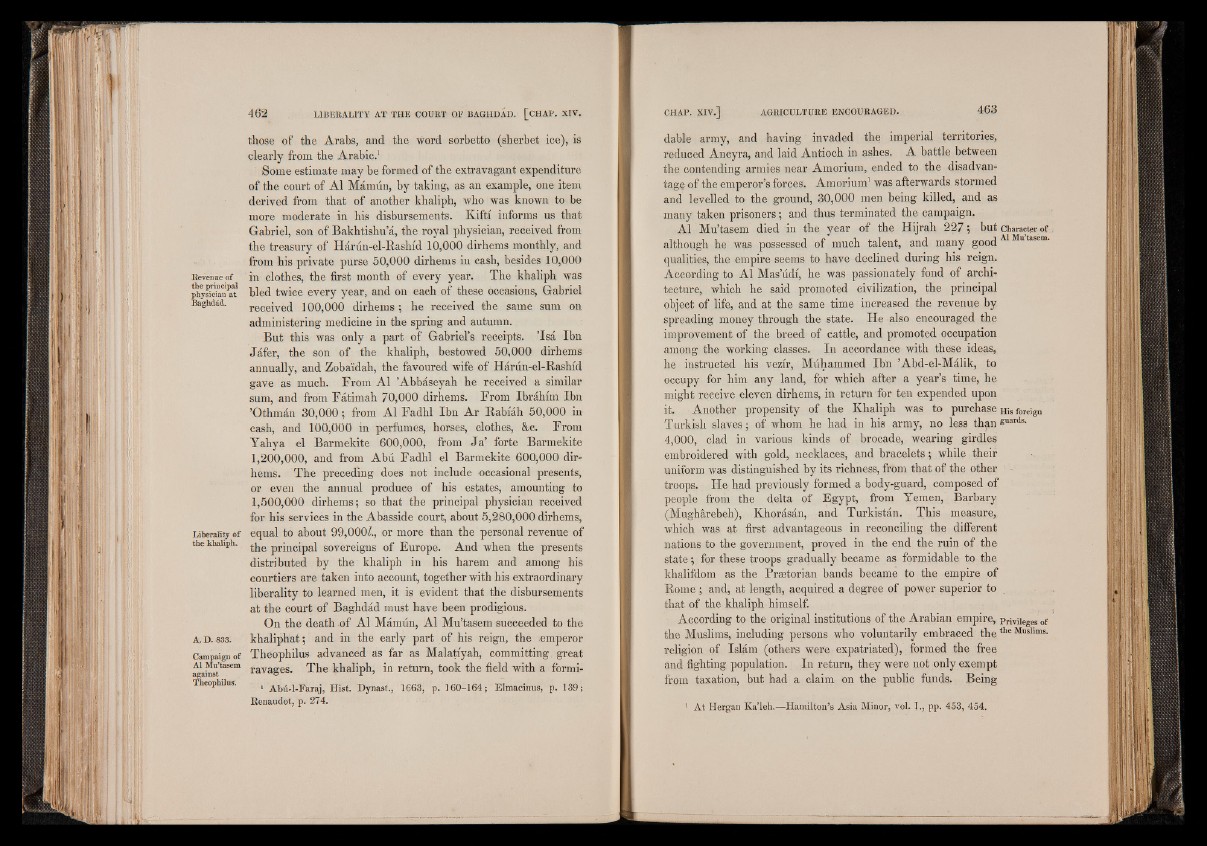
Revenue of
the principal
physician a t
Baghdad.
Liberality of
the khaliph.
A, D. 833.
Campaign of
Al Mu’tasem
against
Theophilns.
those of the Arabs, and the word sorbetto (sherbet ice), is
clearly from the Arabic.1
Some estimate may be formed of the extravagant expenditure
of the court of A1 Mamun, by taking, as an example, one item
derived from that of another khaliph, who was known to be
more moderate in his disbursements. Kifti informs us that
Gabriel, son of Bakhtishu’a, the royal physician, received from
the treasury of Harun-el-Rashid 10,000 dirhems monthly, and
from his private purse 50,000 dirhems in cash, besides 10,000
in clothes, the first month of every year. The khaliph was
bled twice every year, and on each of these occasions, Gabriel
received 100,000 dirhems ; he received the same sum on
administering medicine in the spring and autumn.
But this was only a part of Gabriel’s receipts. ’Isa Ibn
Jafer, the son of the khaliph, bestowed 50,000 dirhems
annually, and Zobaidah, the favoured wife of Harun-el-Rashid
gave as much. From A1 ’Abbaseyah he received a similar
sum, and from Fatimah 70,000 dirhems. From Ibrahim Ibn
’Othman 30,000; from A1 Fadhl Ibn Ar Rabiah 50,000 in
cash, and 100,000 in perfumes, horses, clothes, &c. From
Yahya el Barmekite 600,000, from Ja’ forte Barmekite
1,200,000, and from Abu Fadhl el Barmekite 600,000 dirhems.
The preceding does not include occasional presents,
or even the annual produce of his estates; amounting to
1,500,000 dirhems; so that the principal physician received
for his services in the Abasside court, about 5,280,000 dirhems,
equal to about 99,000^, or more than the personal revenue of
the principal sovereigns of Europe. And when the presents
distributed by the khaliph in his harem and among his
courtiers are taken into account, together with his extraordinary
liberality to learned men, it is evident that the disbursements
at the court of Baghdad must have been prodigious.
On the death of A1 Mamun, A1 Mu’tasem succeeded to the
khaliphat; and in the early part of his reign, the emperor
Tbeophilus advanced as far as Malatiyah, committing great
ravages. The khaliph, in return, took the field with a formi-
' Abu-l-Faraj, Hist. Dynast., 1663, p. 160-164; Elmacinus, p. 139;
Renaudot, p. 274.
dable army, and having invaded the imperial territories,
reduced Ancyra, and laid Antioch in ashes. A battle between
the contending armies near Amorium, ended to the disadvantage
of the emperor’s forces, Amorium1 was afterwards stormed
and levelled to the ground, 30,000 men being killed, and as
many taken prisoners; and thus terminated the campaign.
A1 Mu’tasem died in the year of the Hijrah 2 2 7 ; but character of
although he was possessed of much talent, and many goodA u tasem-
qualities, the empire seems to have declined during his reign.
According to A1 Mas’udi, he was passionately fond of architecture,
which he said promoted civilization, the principal
object of life, and at the same time increased the revenue by
spreading money through the state. He also encouraged the
improvement of the breed of cattle, and promoted occupation
among the working classes. In accordance with these ideas,
he instructed his vezir, Muhammed Ibn ’Abd-el-Malik, to
occupy for him any land, for which after a year’s time, he
might receive eleven dirhems, in return for ten expended upon
it. Another propensity of the Khaliph was to purchase H,s foreign
Turkish slaves; of whom he had in his army, no less than guards-
4,000, clad in various kinds of brocade, wearing girdles
embroidered with gold, necklaces, and bracelets; while their
uniform was distinguished by its richness, from that of the other
troops. He had previously formed a body-guard, composed of
people from the delta of Egypt, from Yemen, Barbary
(Mugharebeh), Khorasan, and Turkistan. This measure,
which was at first advantageous in reconciling the different
nations to the government, proved in the end the ruin of the
state; for these troops gradually became as formidable to the
khalifdom as the Praetorian bands became to the empire of
Rome ; and, at length, acquired a degree of power superior to
that of the khaliph himself.
According to the original institutions of the Arabian empire, privileges of
the Muslims, including persons who voluntarily embraced the1116 Muslims-
religion of Islam (others were expatriated), formed the free
and fighting population. In return, they were not only exempt
from taxation, but had a claim on the public funds. Being
1 At Hergan Ka’leh.—Hamilton’s Asia Minor, vol. I., pp. 453, 454.